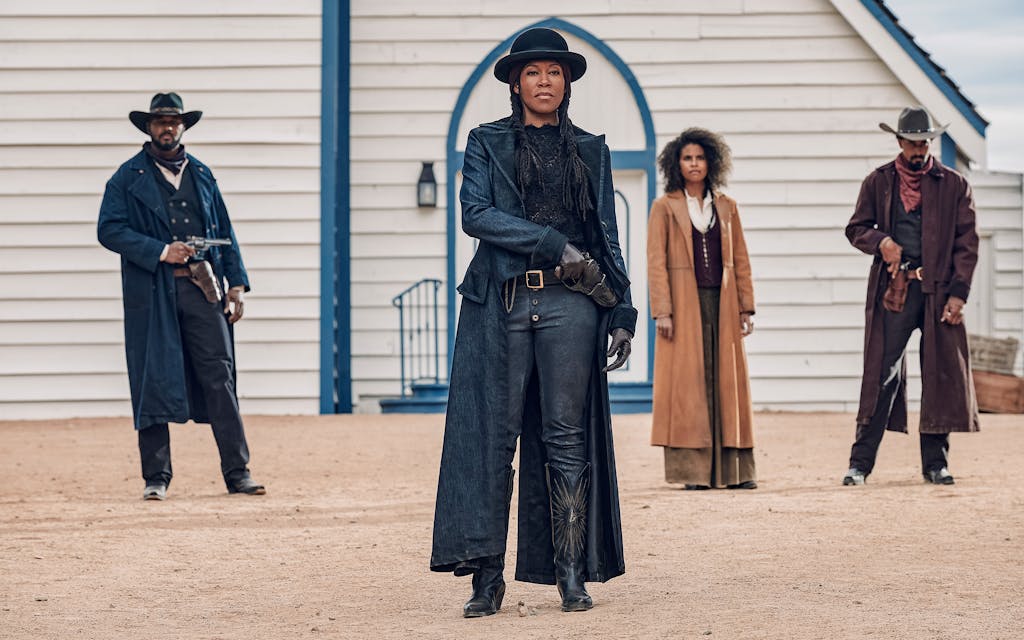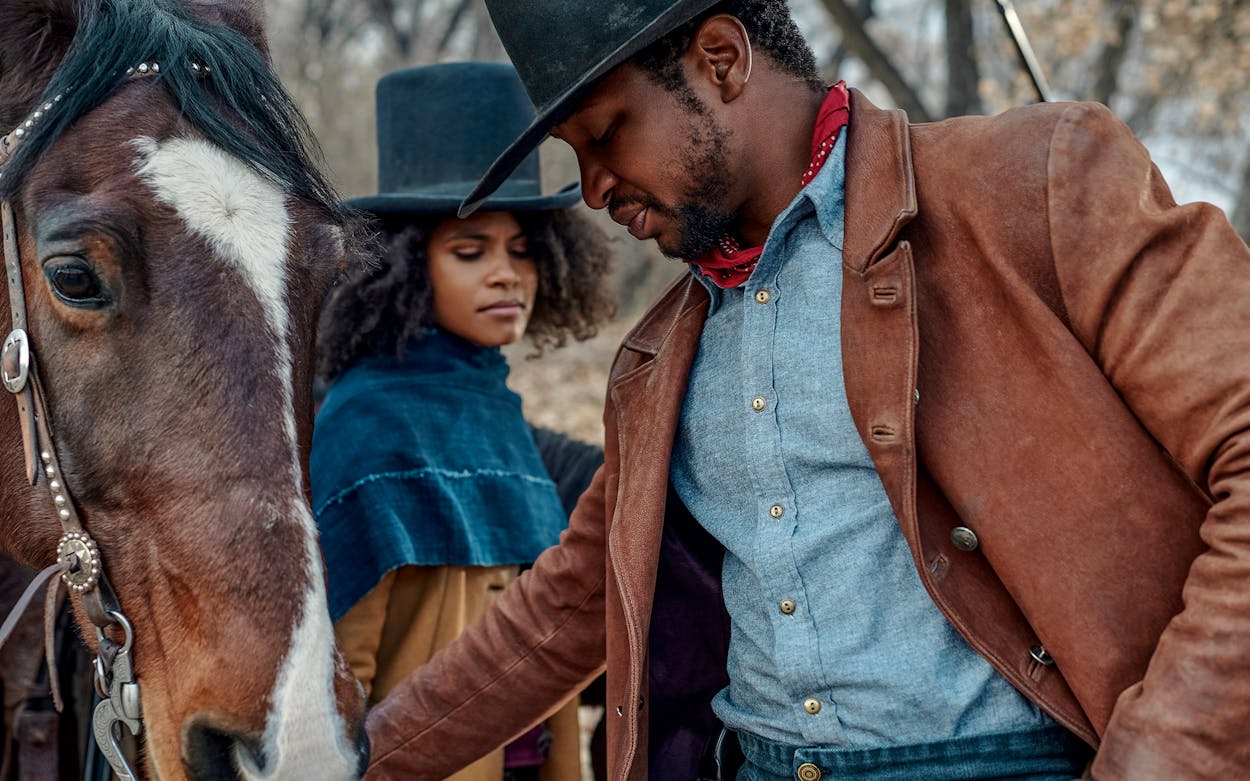This week, Netflix released its first trailer for The Harder They Fall, a film with a to-be-announced premiere date that the streaming giant is trumpeting as a “new school Western.” Watching the two-and-a-half minute clip, however, you might find it decidedly old-school. Never mind all the modern stylization—the bullets and blood splattering in languorous slow motion, the camera lashed to the barrel of a spinning shotgun, the Fela Kuti music bumping on the soundtrack. This thing is steeped in classic Western signifiers: masked bandits, wild shootouts, daring train robberies, and horse hooves thundering across the Santa Fe desert. These things date back to The Great Train Robbery and the very invention of cinema itself.
What makes The Harder They Fall feel new is its cast, a stacked lineup that includes Regina King, Idris Elba, Zazie Beetz, Delroy Lindo, and Metroplex-bred breakout Jonathan Majors. As director Jeymes Samuel promised with They Die By Dawn, the 2013 short that serves as a sort of prequel, he’s out to reclaim the genre for the Wild West’s overlooked lineage of Black cowboys. And he’s finally letting them have the kind of fun they’ve long been denied.
Most of the characters in The Harder They Fall are based on real people. Majors plays Nat Love, whose exploits in the Dakota Territory and the Texas Panhandle earned him the nickname “Deadwood Dick” (and “Red River Dick” before that). Elba is Rufus Buck, the fearsome outlaw whose gang cut a fast and furious swath of rape, robbery, and murder across what is now Oklahoma. Beetz is Stagecoach Mary, the hard-drinking, tough-talking mail carrier who was famed for fending off bandits with her shotgun. And Lindo plays Texas folk hero Bass Reeves, the U.S. Marshal whose exploits have increasingly become hot stuff in Hollywood, after decades of being ignored.
Does any of this make historical sense? Not a lick. There’s no evidence Nat Love ever crossed paths with Rufus Buck—let alone hunted him down for killing his parents, which is the film’s through line. And if LaKeith Stanfield is playing the San Angelo–born Cherokee Bill, that would mean The Harder They Fall has to take place sometime around 1894 or 1895, the peak of Bill’s short-lived outlaw days. In fact, Cherokee Bill and Rufus Buck were both hanged by 1896—some six years after Love had retired to a quiet life as a train porter. That year Stagecoach Mary would have been sixty-four years old, instead of the wildcat played here by thirty-year-old Beetz. None of these characters really belong together in the same story.
The Harder They Fall looks to be playing pretty fast and loose with Western myth, and this is firmly in the genre tradition. That’s what makes it exciting. It’s a movie that says all those Black heroes and villains deserve to have their legends printed, too.
After all, despite the estimate that a quarter of cowboys were Black, the Western has long been dominated by white actors and stories. Some of them were even rewriting Black history as their own. Bass Reeves, for example, might have been the original model for the Lone Ranger. Alan Le May’s classic novel The Searchers was inspired by the adventures of Texas’s famed Black cowboy Britt Johnson. When John Ford adapted it to the screen, John Wayne was the star. Even Nat Love’s legend may have partly inspired a Deadwood Dick serial in 1940, with the hero played by a white guy from Scotland.
The representation of Black cowboys has steadily improved since they were relegated to the “race films” of the first half of the twentieth century. But they’ve most often been in supporting roles: Woody Strode in The Professionals, Danny Glover in Lonesome Dove. The rare movies that center Black people’s stories tend to fall well outside the mainstream, whether it’s Fred Williamson’s blaxploitation Westerns of the ’70s, or low-budget B movies like the 2019 Bass Reeves tale Hell on the Border. Before The Harder They Fall, the biggest film to tackle Nat Love was 1996’s The Cherokee Kid, an HBO movie starring the comedian Sinbad.

Black cowboy movies also tend to be about race, whether they play it as an allegory (1972’s Buck and the Preacher), a somber history lesson (1997’s Buffalo Soldiers), or a provocative joke (Mel Brooks’s Blazing Saddles). The Harder They Fall’s most obvious predecessor, 1993’s Posse, was a similarly flashy, stylized movie likewise crammed with Black stars, including Melvin Van Peebles, Pam Grier, Nipsey Russell, Isaac Hayes, Big Daddy Kane, and Tone Lōc. But for all its fun rapper cameos and loose, kinetic style, even Posse couldn’t help turning dour and didactic, ending with a title card that explicitly scolded Hollywood for its history of whitewashing. Black cowboys have been used mostly to critique Western tropes, rather than just being allowed to enjoy them.
Granted, we just have the trailer to go on, but already The Harder They Fall doesn’t seem all that interested in telling its Black cowboy story through a white prism. The only white actor who gets a line is a crusty old train conductor, casually blown away by Regina King before he can finish his presumed racial epithet. (“He might could have said ‘nincompoop,’” Stanfield points out, to which King shrugs, “We ain’t no nincompoop.”) That’s not to say race won’t be a factor, but it definitely doesn’t appear to be the focus. The movie looks like an old-fashioned, rip-roaring oater that just happens to be about Black people.
This feels noteworthy not just for Black Westerns, but for the modern Western as well. The genre’s far from dead, and every year brings a small yet defiant crop of stories about gunslingers and morally gray lawmen. Some of them even make it to theaters. But by and large, the Western has been supplanted in the popular consciousness by the “revisionist Western”—films that comment on the genre’s tropes from a postmodern distance, like Django Unchained or The Ballad of Buster Scruggs—as well as the “neo-Westerns” that add a modern, existential bleakness, like Unforgiven, No Country for Old Men, or the films of Taylor Sheridan. These days we prefer our Westerns satirical and our cowboys sad.
But every so often, a film comes along that reminds us, as Polygon puts it about The Harder They Fall, “Westerns are freaking sick.” Young Guns, Tombstone, 3:10 to Yuma, the recent Denzel Washington–starring remake of The Magnificent Seven—these movies rode into this well-trod territory with both barrels blazing and managed to briefly get audiences excited about the Western all over again. It remains to be seen whether The Harder They Fall will be as successful or as enjoyable as those, of course. But it’s already brought a similarly “new-school” buzz to the genre, while blazing a new frontier for Black cowboys within it.






